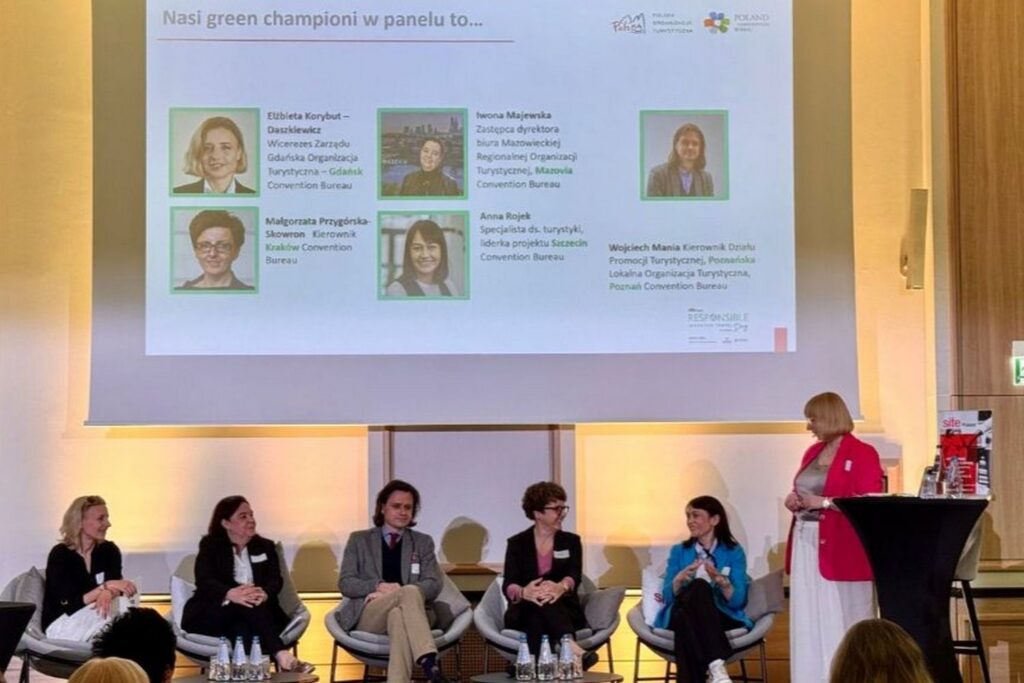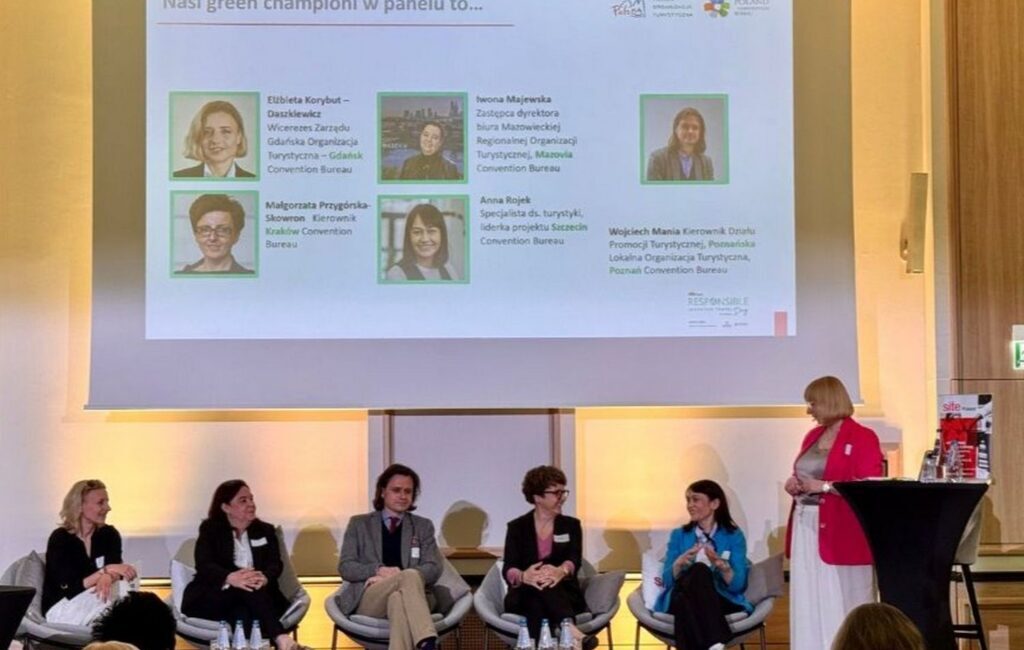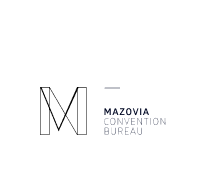On April 28, Mazovia Convention Bureau participated in Responsible Incentive Travel Day 2025. This cyclical event, dedicated to responsible incentive tourism, is part of the “Our impact on people, society and the planet” project, which was initiated at Site Poland Association in 2018. It is dedicated to sustainable development and partnership in the spirit of the 17 UN Sustainable Development Goals. During the session “Poland – the sustainable offer of Polish destinations”, Iwona Majewska – Deputy Director of MROT Office, representing Mazovia Convention Bureau, presented participation in the discussion and the assets of Mazovia.

The program of the event was extremely interesting and included the following lectures and panels:
Opening lecture of the event: “From vagabond to millionaire to philanthropist. Or how to help with your head?” – Lukasz Dlugowski
Session I – Responsible Incentive Travel Organizer
Moderator: Grażyna Lukaszyk
Interviewees: Joanna Montenarh, Agnieszka Jasinska – Goerdt, Anastasia Szerkus, Beata Koziarska
Decalogue of the Organizer
Case studies and discussion – Sustainable activities of Incentive Agencies
Radisson International – presentation – Kamil Ancypa, Regional Director of Sales Poland, Area Sales Office CESEE
Session II – Dialogue with Principals
Moderator: Grażyna Grot – Duziak
Interviewees: Emilia Majewska, Agnieszka Majkowska, Ewa Doromoniec – Vieira, Anna Nowotna – Nadziejko, Katarzyna Pytlak
Sustainable incentive travel from the client’s perspective
Cooperation between Principals and Agencies, challenges and good practices
Session III – Poland – sustainable offer of Polish destinations
Moderator: Aneta Książek
Interviewees: Elżbieta Korybut – Daszkiewicz, Iwona Majewska, Wojciech Mania, Małgorzata Przygórska – Skowron, Anna Rojek
Session IV – Authenticity of the incentive product in different destinations around the world
Moderator: Emilia Kubik
Interviewees: Claudio Andrade Lucena, Karolina Walczowska

Poland – sustainable offer of Polish destinations
During the third session and panel discussion titled. “Poland – sustainable offer of Polish destinations”, Iwona Majewska representing Mazovia Convention Bureau participated in the discussion and presented the advantages of Mazovia. Aspects of the issue presented by all 5 regional representatives of the MICE industry are also worth exploring.
The panel was opened by Aneta Książek, head of the Meetings and Events Bureau of the Polish Tourist Organization (PTO). In the first part of the meeting, Aneta Ksiazek presented the results of the trade fair audit conducted by the PTO, which show the growing importance of sustainability in the context of international trade fairs. Data from the last three years was analyzed, focusing on the participation of Polish exhibitors at IMEX and IBTM (Frankfurt, Las Vegas, Barcelona).
The survey shows that already 47% of respondents (hosted buyers) who spoke with Polish exhibitors are actively interested in sustainable offerings in Polish destinations. An additional 27% change their attitude after learning about specific proposals.
Representatives of five Polish destinations spoke at the panel discussion, presenting their initiatives in implementing sustainability standards.
Gdansk – pioneer of conscious management
Elżbieta Korybut-Daszkiewicz, Vice President of the Gdansk Tourism Organization, highlighted the city’s transformation after joining the GDS Index.The establishment of Green Champion in the structure of Gdansk Tourist Organization – Gdansk Convention Bureau and GDS Index training prove the city’s deep commitment to systemic implementation of sustainability standards.
Gdansk has been consistently strengthening its position as a consciously managed destination for several years. A key turning point was the city’s accession to the Global Destination Sustainability Index, which not only enforces transparency, but above all mobilizes continuous improvement of environmental, social and economic activities.
As Elzbieta Korybut-Daszkiewicz, Vice President of Gdansk Tourism Organization, emphasized, a lot has changed since the first audit:
– the position of “Green Champion” responsible for coordination and implementation of sustainable development policy was established within the structures of Gdańsk Convention Bureau,
– a number of trainings for local stakeholders were conducted – including preparing the industry for the next edition of the GDS Index,
– organization of the workshop “Regenerating Polish Destinations: Sustainable Tourism in Action”,
– local partnerships are being developed with hotels, venues and restaurants that implement environmental certifications, such as Green Key,
– Gdansk promotes low-carbon mobility, supporting event participants in choosing public transportation or bicycling.
It is worth mentioning in passing that Gdansk will host the Velocity conference on June 10-13, 2025.
Krakow – certification as a tool of competitive advantage
Małgorzata Przygórska-Skowron, Manager of the Kraków Convention Bureau, pointed out the role of sustainable development certificates.Kraków, as the first Polish city on the GDS Index, focused on measurability and transparency of its activities.
As Małgorzata Przygórska-Skowron pointed out, the decision to join the GDS-Movement was the result of growing expectations from the international market and congress organizers. Environmental certifications, such as Green Key, ISO 20121 or EMAS, are gaining real importance in sourcing events because:
– more and more institutional and association clients are asking for a specific list of certified facilities,
– the city’s systemic efforts allow for the creation of coherent marketing narratives, such as around the themes of ecology, UNESCO heritage and social responsibility,
– the local DMO works closely with the hotel and catering industry to offer eco-friendly packages (e.g., plant-based meals, giving up plastic).
Krakow treats certification as an element of competitive advantage, attracting conscious customers from all over Europe. The GS Index initiative is recognized in Europe and around the world. Simply joining it and “going down this road” is considered valuable, as it indicates that the city is trying to improve the quality of its services or offerings.
In the context of the GDS Index, the role of DMOs (Destination Management Organization) is highlighted. While their merit in terms of companies’ implementation of sustainable practices may be seen as the smallest (because others are doing it), it is a huge effort to gather information about what the city is already doing in the four areas. Answers to questions for the index must be backed up by reports and evidence, not just made up.
The role of a so-called Green Champion (as in Gdansk) or a person specializing in this in another cell, is to laboriously collect data about the city on the one hand, and on the other to educate the industry about the fact that the certifications make sense. Entities (hotels, event agencies, PCOs, DMCs) often implement sustainable practices independently of the GDS Index, but certification is important, especially as large hotel chains and companies embrace it.
It is expected that in the future, sustainability requirements will become the norm in the supplier (partner) chain, and a mere declaration will not be enough. In Krakow, despite 30 certificates, the number of companies providing tourism services is much higher, which means there is still a long way to go for the industry. Currently, cheap mass tourism offers still dominate, but respect is expressed for those who build their offers responsibly and are not afraid to go against the tide of customer expectations.
Malgorzata Przygórska-Skowron invited visitors to visit a tab on the Krakow Convention Bureau website called “Sustainable Meetings,” where interviews with Krakow partners and companies implementing sustainable offerings or holding certifications are presented.
Mazovia – a return to nature and heritage
Iwona Majewska, Deputy Director of the Mazovia Regional Tourist Organization – Mazovia Convention Bureau, noted the growing interest in events organized in natural surroundings and places associated with the region’s folk culture. Facilities such as the Kampinos National Park and open-air museums are becoming attractive alternatives to traditional conference spaces. The region’s unique natural resources and cultural heritage fit perfectly into the global trend of a return to nature and authentic experiences.
The region is promoting such places as:
– Kampinos National Park – ideal for ecological workshops and team-building events,
– Mazovian vineyards – increasingly used as event spaces,
– Mazovia’s Team Matecznik,
– open-air museums and museum facilities, such as the Radom Village Museum and the Kurpie Homestead in Kadzidle – which allow to combine history with education and integration.
Mazovia promotes itself as the “heart of Poland,” and the slow life trend fits in with its offerings. A study conducted in 2024 indicated that the largest tourist traffic outside of Warsaw is concentrated in the Kampinos National Park (1.2 million visitors) and around Zegrzynski Lake (Legionowo County), as well as in open-air museums.
A few years earlier, it was decided to study the potential of rural tourism in Mazovia, understood more broadly than agritourism. As part of the “Mazovian Village Invites” project, facilities offering more than just accommodation and food were examined. Despite the lack of certificates, in the second year of the project they began to analyze whether facilities in rural areas of Mazovia implement the principles of sustainable development.
It turned out that many owners strictly adhere to these principles in three areas: environmental (permaculture gardens, eliminating plastic, collecting rainwater, using natural building materials, leaving meadows for animals), social and economic (buying from local producers, shortening supply chains, working with the local community, including folk artists in their offerings). Many of the sites are suitable for incentive travel offers, smaller corporate meetings, conferences or training sessions. The project produced a publication (available online), recorded interviews and promotional videos with owners, and organized a conference.
Subsequent iterations of the project, such as “Traditions of the Mazovian countryside,” were aimed at finding artists who cultivate dying professions and organizing intergenerational exchanges, such as taking vocational school students to these artists. In later years, young people with intellectual problems from special educational centers were added. These projects, especially the experiences of young people, restored the belief that “we won’t destroy everything” and something will remain for future generations. It was emphasized that “Fashion for Mazovia” and “Fashion for Slow Life” resulted from these activities.
Poznan – sustainable lifestyle for residents
Wojciech Mania, Head of Tourism Promotion Department, Poznań Local Tourist Organization – Poznań Convention Bureau, pointed to a number of initiatives. Poznań is alive with major events, especially those related to the Poznań Fair. With more than 100 years of history, the fair is a distinguishing feature of the city and is historically linked to merchant traditions. The fair is an “interesting lesson for the city” in the context of sustainable development (ecological, social and economic). An example is the history of the 1929 Universal National Exposition (PWK), after which part of the fairgrounds were turned into towns for the unemployed, which shows the social aspect of history.
Today, the Fair faces the challenge of “reinventing itself” due to pandemonium, technology and competition. Despite the large number of events (more than 300 a year) and attendees (at least 1.3 million), the Fair, being in the center of the city, has long functioned as a “city within a city,” a closed enclave. One of the more interesting processes is their opening up to residents by offering public events (fairs of regional products, fairs, concerts) and making the area available for daily passage. This change is part of the trend of sustainable change in the economy and urban space, where tourism becomes a tool for development, not just an offer for tourists.
The fair operates as a city company, which poses specific management challenges. They create an entire ecosystem of events, building Poznań’s reputation as a meeting city. Sustainability in Poznań is all about:
– free public transportation for participants in selected events,
openness of the MTP fairgrounds to residents – creating social relations and eliminating barriers between business tourism and the local community,
– activation of local partners – especially gastronomy and culture: including festivals, beer routes, food trucks with regional cuisine, joint events with NGOs.
In the process of acquiring congresses (bidding), sustainability themes are increasingly being raised, and initiatives are being proposed for attendees to enrich the “milieu of the city” (surroundings). An example of an initiative that promotes sustainable transportation is free public transportation for event participants as part of a special package.
The GDS Index and destination certification initiative itself has not yet been launched in Poznań, but as Wojciech Mania says – everything is ahead of us. Also highlighted in Poznań as an element of sustainable urban space development is the historic system of “green wedges,” designed before the war by urban planner Prof. Wladyslaw Czarnecki and biologist and botanist Prof. Adam Wodziczko, using river valleys and fortifications to strengthen the city’s natural system. This system still provides the city with aeration and ecological corridors today.
Turning to the global context, data from the tourism portal was cited, according to which 8% of carbon emissions come from tourism activities. Concern was also expressed that by 2030, despite declarations (e.g. from Glasgow), these emissions could increase. It was highlighted that despite growing awareness, the head of Booking Holdings admitted, based on the data, that price is still the deciding factor in travel choices. Despite this, the city focuses on authenticity and inclusivity, combining modernity with local heritage, which builds a positive experience for participants and supports the promotion of the city as a responsible and friendly destination.
In closing, Wojciech Mania mentioned the Harpagan craft brewery, which in cooperation with Poznan University of Life Sciences is implementing a project to produce low- and non-alcoholic beer from plant waste. He also mentioned the Poznań Heritage Center (operator of the Poznań Gate and the Enigma Cipher Center), which focuses on river activities, organic gardens and interpretation of natural heritage, offering intimate events.
Szczecin – Floating Garden’s green vision in practice
Anna Rojek, liderka projektu Szczecin Convention Bureau, wspomniała o strategii rozwoju miasta. Od 2008 roku Szczecin realizuje „Floating Garden”, która opiera się na powiązaniu rozwoju miasta z naturą, aby stworzyć ekologiczną metropolię przyjazną ludziom i środowisku. Wejście na drogę zrównoważonego rozwoju jest dla Szczecina naturalnym krokiem, a dołączenie do inicjatywy GDS Index w marcu 2025 roku jest dalszym zadeklarowaniem się w tym kierunku. Ma to na celu lepszą komunikację i budowanie konkurencyjności na rynku MICE. To jasny sygnał dla rynku międzynarodowego: miasto stawia na turystykę odpowiedzialną.
Z badań przeprowadzonych do strategii funkcjonowania Szczecin CVB wynika, iż Szczecin chętnie wybierają krajowi organizatorzy spotkań pochodzący z Polski zachodniej i centralnej (główne korporacje oraz stowarzyszenia). Szczecin rozwija swoją ofertę w kierunku:
– współpracy z branżą świadomą środowiskowo, szczególnie z Polski Zachodniej, Niemiec i Skandynawii,
– wydarzeń opartych o elementy natury (parki, woda, zielone przestrzenie miejskie),
– edukacji lokalnych partnerów, by zapewnić spójność działań z oczekiwaniami rynku międzynarodowego.
Among the challenges cited were the need for further integration of the industry and the development of certification, but also the great potential offered by the location and the strong identity of the place.
The Szczecin Convention Bureau operates within the structure of the city’s Shipping Company Szczecin Events, offering many water attractions. In addition to joining the GDS Index, the city is pursuing a development strategy that relates strongly to the UN Sustainable Development Goals, with an appendix of sustainable tourism and events programs. While education of the industry is still needed, Szczecin has fantastic facilities such as the Mieczyslaw Karlowicz Philharmonic Hall, the Water Factory and the Prof. Jerzy Stelmach Marine Science Center.
Conclusions
Sustainability is no longer just a trend, but a necessity – especially in the MICE sector, where social and environmental responsibility increasingly determine the choice of destination. Today’s discussion highlighted key aspects of this trend, which is not only a response to global challenges, but also an opportunity to strengthen the competitiveness of Polish cities. Destination representatives are responsible for creating an image, setting paths and promoting good examples in this sphere.
– Sustainability as a priority – A concerted move toward sustainability is becoming essential to attracting international event organizers. According to a survey conducted by the Poland Convention Bureau (PCB), sustainability is becoming an increasingly important factor that clients consider in their decision. However, as the survey shows, only some event organizers make it a priority. It is important to provide appropriate education and communication about the options available, which can encourage a more informed choice.
– Promotion of certification and best practices – Certifications, such as the GDS Index, have become a tool to distinguish cities and regions in terms of sustainability. Gdansk and Krakow, as pioneers in Poland, show how important it is to have international certifications that not only increase prestige, but also attract responsible event organizers. With certifications such as Green Key, EcoLabel or ISO 14001, cities can emphasize their commitment to environmental and social responsibility, which is an important part of their marketing strategies.
– Increased awareness and education – One of the key takeaways from today’s discussion is the need for education among both organizers and tourists. Showcasing solutions related to green practices, such as certified hotels, green transportation, sustainable dining and reducing carbon footprints, can not only be an asset in attracting events, but also an element of building awareness among industry decision-makers.
– Integration with local initiatives – An important element in promoting sustainable tourism is cooperation with local stakeholders – from cultural institutions to local food producers to local communities. Destinations such as Poznań, Gdańsk, Mazovia and Szczecin are seeing increasing cooperation with local festivals, cultural initiatives, as well as the food and beverage sector, which relies on local products and sustainable cuisine. This kind of cooperation strengthens the MICE offering, attracting organizers who are looking for authenticity and added value in the venue.
– The Role of the Green Champion – The appointment of specialists responsible for sustainability in the structures of destination management organizations (DMOs), as was done in Gdansk, is an excellent example of the city’s commitment to promoting green standards. The role of the Green Champion is becoming crucial in the successful implementation of a destination’s sustainability strategy. Along with certification, this initiative is a step towards a future in which sustainability will become not just a trend, but a standard.
In conclusion, sustainability in the meetings and events industry is becoming the foundation of a destination’s competitiveness. Promoting green solutions, education, supporting local initiatives and integrating certification are key elements in attracting responsible event organizers. As an industry, we have a huge responsibility in creating this change, paving the path of sustainability and promoting best practices around the world.
Source and photos: Polish Tourism Organization


